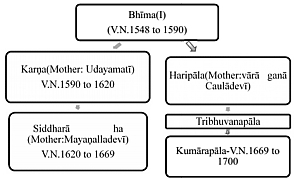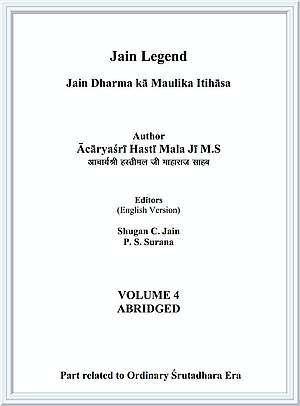| 39th Epochal-ācārya Vinayamitra | 52nd Pontiff Ācārya Sūrasena | |
| Birth | V.N.1568 | V.N.1601 |
| Initiation into monkhood | V.N.1578 | V.N.1623 |
| Attained Ācārya status | V.N.1597 | V.N.1644 |
| Heavenly Abode | V.N.1683 | V.N.1708 |
| Period of household life | 10 years | 22 years |
| Period of ordinary monk | 19 years | 21 years |
| Period of Ācārya status | 86 years | 64 years |
| Complete monkhood | 105 years | 85 years |
| Life span | 115 years, 7 months, 7 days | 107 years |
| After the heavenly abode of the 38th Yugapradhānācārya Dharmaghoṣa, four-fold Congregation appointed the celebrated monk Śrī Vinayamitra as the 39th Epochal-ācārya of the Epochal-ācārya tradition. | After 51st Pontiff Ācārya Devaṛṣi, departed to heavenly abode in V.N. 1644 four-fold Congregation appointed Śrī Sūrasena Monk as 52nd Pontiff successor of Lord Mahāvīra. |
The Political Situation during the tenure of
51st And 52nd Successor Pontiffs of Lord Mahāvīra
Siddharāja Jaya Siṃha, the Ruler of Gurjara Region
Name of the ācārya
Ācārya Devaṛṣi (II) - 51st Pontiff
Ācārya Sūrasena - 52nd Pontiff
Period in ācārya status
V.N. 1589 1644
V.N. 1644 1708
The King of Gurjara
Cālukyarāja Bhīma
Cālukyarāja Karṇa
Cālukyarāja Siddharāja Jaya Siṃha
Regime
V.N. 1548 1590
V.N. 1590 1620
V.N. 1620 1669
When Ācārya Devaṛṣi, was ordained as the 51st Pontiff of Śramaṇa Lord Mahāvīra, in V.N. 1589, Bhīma was his contemporary Cālukya king ruling the vast Gurjara Kingdom. During the second year of his pontificate, i.e. in V.N. 1590, King Bhīma had breathed his last. King Karṇa succeeded to the throne of Cālukya kingdom in the same year.
After ruling the Gurjara Kingdom for 29 years 8 months and 21 days, i.e. from V.N. 1590 to the Pauṣa Kṛṣṇa second day in V.N. 1620, King Karṇa, he crowned his 3 year old son, Siddharāja Jaya Siṃha on Saturday, the third day of dark fortnight of Pauṣa month in Vikram 1150 (V.N. 1620) as the king of vast Gujarat.
Later King Karṇa established his authority on Āśāpallī and built a city after his name, Karṇāvatīpura and made it his capital. He also safeguarded and ruled the vast Paṭṭaṇa kingdom, as a regent king till his son attained adolescence.
After the demise of Karṇa, King Jaya Siṃha merged the vast kingdom of Āśāpallī -Karṇāvatī to the vast Gurjara Empire, he had inherited. Thus from a very tender age itself King Jaya Siṃha had held the reins of the colossal Gurjara Kingdom in his hands. Madanapāla, the brother of Queen Udayamatī, wife of King Karṇa, was appointed as the guardian of King Jaya Siṃha. But the people of Aṇahillapura Paṭṭaṇa were severely victimised by the atrocities of Madanapāla, As such, immediately after attaining youth, Jaya Siṃha secretly made arrangements to kill Madanapāla using he latter's own bodyguards. Later on he appointed minister Śāntu as his Prime Minister.
A very mysterious and amazing event was mentioned in Prabandha Cintāmaṇi about King Jaya Siṃha. The consort of King Jayakeśī of Karnataka gave birth to a baby girl. She was named as Mayaṇalladevī. Suddenly one day the baby regained the memory of her previous birth. She realised that she was a Brahmin woman in her previous life. Before her death, she firmly decided that in her next birth she would ban the 'Bāhūloḍa' tax imposed on the pilgrims of Someśwara. Thus resolving she fasted unto death and died in the pilgrim centre of Someśwara and was reborn as the daughter of King Jayakeśī. Subsequently she vowed that she would marry none other than the King of Gujarat, in order to relieve the pilgrims of Someśwara from the burden of paying the Bāhūloḍa tax.
When the king of Karnataka Jayakeśī came to know of the vow taken by her daughter, he sent his ministers to implore King Karṇa to marry his daughter and accept her as his queen. As King Karṇa found the princess unattractive, he rejected the marriage proposal. Disappointed by this, the princess Mayaṇalladevī along with her eight friends prepared for a voluntary death. On hearing the news Udayamatī, mother of King Karṇa was deeply moved, and she too resolved to die in the same manner. When Karṇa was informed of her mother's decision of voluntary death, as a dutiful son, he wanted to save his mother's life. Hence he married Mayaṇalladevī. Even after marriage, Karṇa neither entered the queenconsort's apartments nor glanced at her.
Thus a few months elapsed. One day minister Muṃjāla came to know from a reliable courtier that King Karṇa was strongly attracted towards a low-caste woman and was inclined to have a relationship with her. Muṃjāla had arranged Mayaṇalladevī to wear a garb similar to that of the low-caste woman and sent her to the sanctum of the king. In the darkness, Karṇa mistook Mayaṇalladevī for his low-caste beloved and made love with her. While leaving the room, Mayaṇalladevī asked his ring as a token of remembrance and went to her castle. She conceived the same night.
The next morning, King Karṇa felt remorse for his immoral deed, the previous night and as a measure of repentance he decided to die. Having learnt about the king's firm decision to give up his life, minister Muṃjāla had divulged the entire secret. He reassured him that the woman he made love with the previous night was none other than Mayaṇalladevī, his own queen-consort, a noble descent and the daughter of King Jayakeśī. After seeing the ring and his queen Mayaṇalladevī, he finally believed that he did not perform any heinous act.
After this incident, king Karṇa behaved as an ideal loyal husband with Mayaṇalladevī. In course of time, Mayaṇalladevī gave birth to a son and the King's happiness knew no bounds. He named the prince as Jaya Siṃha. As already mentioned under the life history of Hemacandra Ācārya, Jaya Siṃha was crowned at the age of 3 in Vikram 1150 on Saturday, the third day of dark fortnight of Pauṣa month.
After mastering the studies and politics, King Jaya Siṃha brought about radical changes in the total administrative structure, consolidating Gurjara kingdom and providing all amenities to his subjects. In order to fulfil the vow of his mother Mayaṇalladevī, he completely and permanently abolished the Bāhuloḍa tax paid by the pilgrims of Somanātha.
Mayaṇalladevī felt very happy when her son Jaya Siṃha, the Cālukya king announced the exemption of the tax. She went to Someśwara temple and worshipped Somanātha with gold worth 12.5 million.
When King Jaya Siṃha accompanied her mother on Someśwara pilgrimage, Yaśovarmā, the king of Mālawa dynasty desirous of annexing the vast Gurjara kingdom, took advantage of the situation and invaded it. Having come to know about this, the chief minister Śāntu immediately rushed to Yaśovarmā and with his oratory skills convinced him to return back to his kingdom.
After returning from Someśwara, when Jaya Siṃha heard of the attack by Mālawa king, he became enraged and decided to avenge the audacious Yaśovarmā. On making all the necessary arrangements for the military expedition, one day he along with his most powerful and massive brigade marched towards Dhārā Nagarī, the capital of Mālawa kingdom. Having found the mighty army of the enemy, the terrified Yaśovarmā ran away from the battlefield along with his army to his capital Dhārā Nagarī and locked the portcullis of the city rampart. The army of Siddharāja besieged the city for twelve years. Finally, with the forceful attack of elephants, the heavy iron beams of the portcullis broke open and the elephants started entering the gate. Jaya Siṃha with his army entered the city and imprisoned Yaśovarmā. Later, he annexed Mālawa kingdom to his empire and extended his rule all over.
Siddharāja triumphantly entered the city with people celebrating his victory over Yaśovarmā. Later Hemacandra Sūri conceding to the desire of Siddharāja wrote a voluminous text 'Siddha Hema Vyākaraṇa' after consulting many books on grammar. It is a marvellous and lucid work comprising five Aṃgas and 125000 verses altogether. Felicitating the exemplary work, the text was brought to the king with all royal honours by placing it in the royal seat, with a royal canopy held over it and fanning it with fly whisks on an elephant's bade, celebrating the occasion like a grand festival. After worship, it was kept in the royal treasury. The very name of the book indicates both their names Siddha i.e. Siddharāja Jaya Siṃha and Hema omniscient Hemacandra Sūri, thus making both of them immortal.
Though Siddharāja himself was a follower of Śiva (Śaivism), yet under the instructions of Hemacandra, he showed equal respect to all the religions. His regime was marked with peace and prosperity. He subjugated and annexed a rich and powerful kingdom like Mālawa, dispensed justice and fair administration to the people. He was always victorious in his military campaigns. King Jaya Siṃha was adorned with the tile 'Siddharāja either because of his victories or because he himself sat on the throne at a very tender age of 3 years'. Even today in the pages of history King Jaya Siṃha of Gurjara kingdom is described as Siddharāja Jaya Siṃha.
Siddharāja had no children to succeed to the throne and to rule his kingdom. So his last days were spent in distress and agony. Through astrologers, he came to know that Kumārapāla will succeed to the throne after his death. This was also one of the reasons for his sorrow. As a matter of fact, he did not like the vision of a low born sitting on the throne of pious Cālukya dynasty and ruling the kingdom as his successor. The event related to the birth of Kumārapāla is as follows: Bhīma, the paternal grandfather of Siddharāja Jaya Siṃha heard many glorious tales of a concubine called Caulādevī. She was a most beautiful lady, endowed with such divine attributes that even women of high and noble birth would not get tired of praising her and her virtues. King Bhīma sent his dagger worth 125000 coins to her through a loyal servant as front money, to test her. After sending the dagger to her, King Bhīma marched to Mālawa on a military expedition and stayed there for two years. Caulādevī spent those two years like a chaste woman betrothed to King Bhīma, as she had accepted the dagger as an advance payment from him. She did not even look at the face of another man. After returning from Mālawa, Bhīma learnt about Caulādevī, and her chastity from his spies. He was charmed by her virtues. He at once brought her to the palace with due honour and made her his queen in a legitimate manner. King Bhīma became father of Haripāla through Caulādevī. In course of time, Haripāla begot a son called Tribhuvanapāla and his son was Kumārapāla. As Kumārapāla was born in the maternal lineage of a concubine, Siddharāja despised Kumārapāla and even tried to kill him, for otherwise he would inherit the sacred throne of Cālukya dynasty. Though the rest of his life was very quintessential and laudable, this incident spoiled his last days making him desperate and miserable.
In 49 years of his long reign Gurjara kingdom attained unprecedented progress and prosperity. Siddharāja, the mighty king of Gurjara of Vikram 12th Century died in Vikram 1199.
The contemporary great ācāryas of Siddharāja were Ācārya Deva Sūri, Ācārya Hemacandra Sūri - the omniscient of Kaliyuga and Dādā Jinadatta Sūri. Ācārya Deva Sūri had spiritual disputation with Digambarācārya Kumudacandra, the holy teacher of King Jayakeśī of Karnataka, (maternal grandfather of Siddharāja) in the royal court of Siddharāja. This was an exemplary and historic example of his love for justice. Though Ācārya Kumudacandra was his grandfather's holy teacher, King Siddharāja without any prejudice or favouritism declared Śvetāmbarācārya Deva Sūri, as victor and presented him epistle of victory.

Thus Kumārapāla was the son of siddharāja's cousin brother.
 Acharya Hasti Mala
Acharya Hasti Mala
